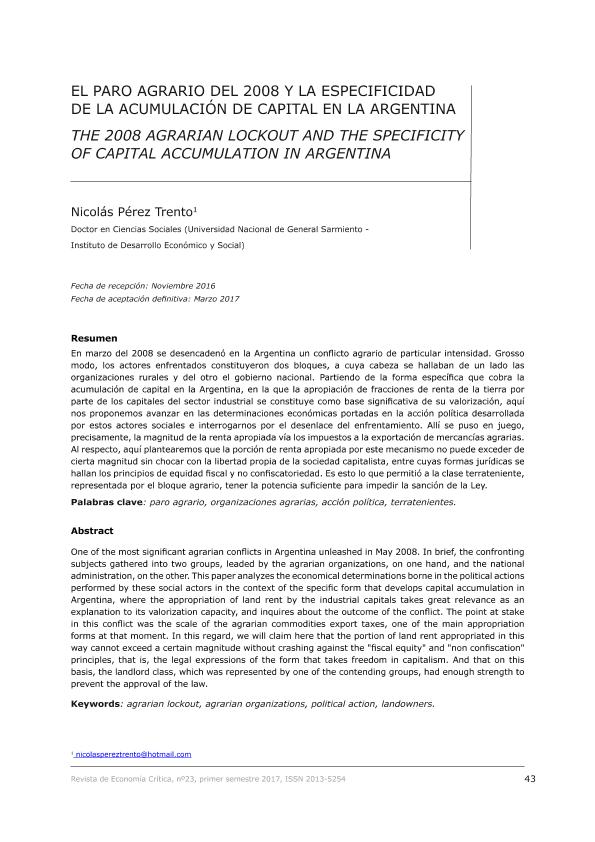Artículo
En marzo del 2008 se desencadenó en la Argentina un conflicto agrario de particular intensidad. Grosso modo, los actores enfrentados constituyeron dos bloques, a cuya cabeza se hallaban de un lado las organizaciones rurales y del otro el gobierno nacional. Partiendo de la forma específica que cobra la acumulación de capital en la Argentina, en la que la apropiación de fracciones de renta de la tierra por parte de los capitales del sector industrial se constituye como base significativa de su valorización, aquí nos proponemos avanzar en las determinaciones económicas portadas en la acción política desarrollada por estos actores sociales e interrogarnos por el desenlace del enfrentamiento. Allí se puso en juego, precisamente, la magnitud de la renta apropiada vía los impuestos a la exportación de mercancías agrarias. Al respecto, aquí plantearemos que la porción de renta apropiada por este mecanismo no puede exceder de cierta magnitud sin chocar con la libertad propia de la sociedad capitalista, entre cuyas formas jurídicas se hallan los principios de equidad fiscal y no confiscatoriedad. Es esto lo que permitió a la clase terrateniente, representada por el bloque agrario, tener la potencia suficiente para impedir la sanción de la Ley. One of the most significant agrarian conflicts in Argentina unleashed in May 2008. In brief, the confronting subjects gathered into two groups, leaded by the agrarian organizations, on one hand, and the national administration, on the other. This paper analyzes the economical determinations borne in the political actions performed by these social actors in the context of the specific form that develops capital accumulation in Argentina, where the appropriation of land rent by the industrial capitals takes great relevance as an explanation to its valorization capacity, and inquires about the outcome of the conflict. The point at stake in this conflict was the scale of the agrarian commodities export taxes, one of the main appropriation forms at that moment. In this regard, we will claim here that the portion of land rent appropriated in this way cannot exceed a certain magnitude without crashing against the "fiscal equity" and "non confiscation" principles, that is, the legal expressions of the form that takes freedom in capitalism. And that on this basis, the landlord class, which was represented by one of the contending groups, had enough strength to prevent the approval of the law.
El paro agrario del 2008 y la especificidad de la acumulación de capital en la Argentina
Título:
The 2008 agrarian lockout and the specificity of capital accumulation in Argentina
Fecha de publicación:
06/2017
Editorial:
Asociación Cultural Economía Crítica
Revista:
Revista de Economía Crítica
ISSN:
1696-0866
Idioma:
Español
Tipo de recurso:
Artículo publicado
Clasificación temática:
Resumen
Archivos asociados
Licencia
Identificadores
Colecciones
Articulos(SEDE CENTRAL)
Articulos de SEDE CENTRAL
Articulos de SEDE CENTRAL
Citación
Pérez Trento, Nicolás Sebastián; El paro agrario del 2008 y la especificidad de la acumulación de capital en la Argentina; Asociación Cultural Economía Crítica; Revista de Economía Crítica; 23; 6-2017; 43-59
Compartir




